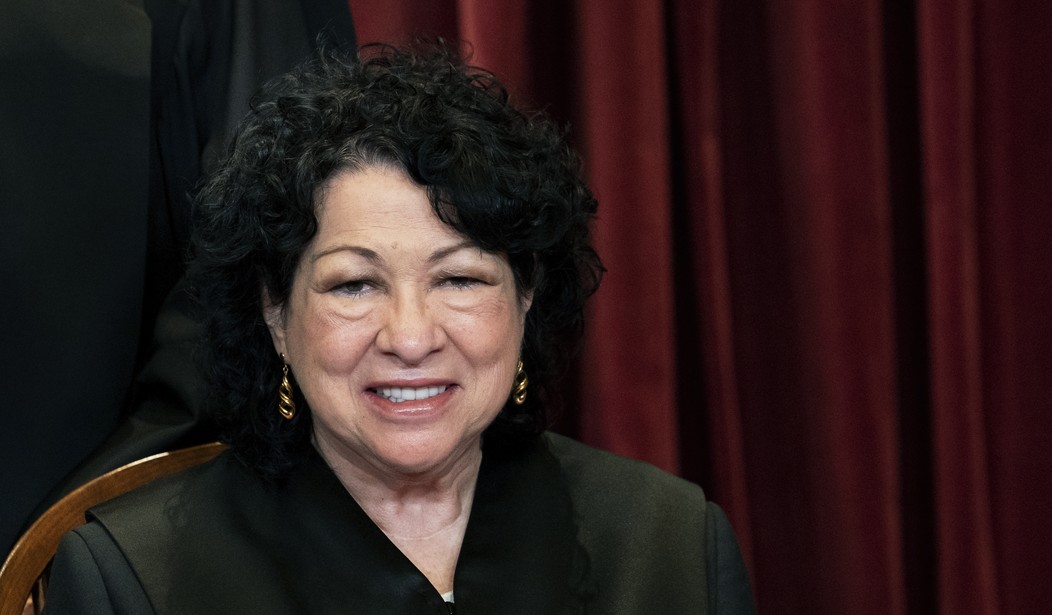Supreme Court Justice Sonia Sotomayor visited Harvard University last week to accept the Radcliffe Medal, which, says Harvard, "is presented annually to an individual who has had a transformative impact on society."
In 2018, Harvard gave the award to Hillary Clinton -- the former secretary of state who lost the 2016 presidential election to Donald Trump. In 2015, they gave it to Justice Ruth Bader Ginsburg -- who was then Sotomayor's Supreme Court colleague and ideological compatriot. In 2009, they gave it to then-retired Justice Sandra Day O'Connor -- who co-authored the court's 1992 opinion in Planned Parenthood v. Casey, which upheld Roe v. Wade in declaring abortion a constitutional right.
In accepting her own Radcliffe Medal, Sotomayor told the audience at Harvard that she was saddened by some of the decisions the Supreme Court had made during her tenure.
"There are days that I've come to my office after an announcement of a case and closed my door and cried," Sotomayor said, according to The New York Times. "There have been those days. And there's likely to be more."
"There are moments when I'm deeply, deeply sad," Sotomayor said. "There are moments when, yes, even I feel desperation. We all do. But you have to own it, you have to accept it, you have to shed tears and then you have to wipe them and get up."
The Times reported that Sotomayor made these remarks "without citing any specific cases."
Sotomayor herself, however, has joined in some opinions that could make other humans cry.
Specifically, she took the wrong position in two of the most significant cases the court has reviewed during her tenure.
Recommended
In 2014, the court took up the case of Burwell v. Hobby Lobby Stores. It involved the freedom of conscience and the free exercise of religion -- a right expressly protected by the First Amendment.
After enactment of the Patient Protection and Affordable Care Act -- Obamacare -- the Obama administration issued a regulation that required the health insurance plans that businesses were mandated to purchase for their employees to cover all "Food and Drug Administration approved contraceptive methods" and "sterilization procedures."
Some of these "contraceptive methods" were in fact abortifacients.
The Green family, who owns Hobby Lobby Stores, went to court to protect their right not to provide those methods.
"The Greens and their businesses ... refrain from business activities forbidden by their religious beliefs," they said in a brief submitted to the Supreme Court.
"The Greens believe that human beings deserve protection from the moment of conception, and that providing insurance coverage for items that risk killing an embryo makes them complicit in the practice of abortion," said their brief. "Hobby Lobby's health plan therefore excludes drugs that can terminate a pregnancy, such as RU-486. The plan also excludes four drugs or devices that can prevent an embryo from implanting in the womb -- namely, Plan B, Ella, and two types of intrauterine devices."
They argued that the federal government could not force them to violate their religious beliefs by compelling them to provide health insurance that covered these drugs and devices.
The Obama administration took them all they way to the Supreme Court. Fortunately, the court ruled 5-4 in favor of Hobby Lobby. The majority opinion, written by Justice Samuel Alito, argued that the government's contraceptive regulation violated a federal law called the Religious Freedom Restoration Act (RFRA) -- rather than the simply the First Amendment. "We hold that the regulations that impose this obligation violate RFRA, which prohibits the Federal Government from taking any action that substantially burdens the exercise of religion unless that action constitutes the least restrictive means of serving a compelling government interest," Alito wrote.
Sotomayor was one of the four who voted against Hobby Lobby.
She joined a dissenting opinion written by Justice Ginsburg.
Ginsburg argued that the government could force a family-owned for-profit corporation to buy an insurance policy that violated their religious beliefs. "The ACA's contraceptive coverage requirement applies generally," she wrote in the opinion joined by Sotomayor, "it is 'otherwise valid,' it trains on women's well being, not on the exercise of religion, and any effect it has on such exercise is incidental."
In 2021, the Supreme Court heard arguments in Dobbs v. Jackson Women's Health. At issue in this case was a Mississippi law that banned abortion after 15 weeks.
During oral arguments in this case, Sotomayor told the Mississippi solicitor general that when a human life begins is debatable.
"The issue of when life begins has been hotly debated by philosophers since the beginning of time," she said. "It's still debated in religions."
"So, when you say this is the only right [abortion] that takes away from the state the ability to protect a life, that's a religious view, isn't it," she said, "because it assumes that a fetus is a life at -- when?"
In this case, the court ruled 6-3 that there is no constitutional right to abortion. Sotomayor joined Justices Stephen Breyer and Elena Kagan in dissenting.
Did Sotomayor then retreat to her office and cry? We do not know.
But the court's decision to overturn Roe v. Wade did make many who respect the right to life cry out in joy.
























Join the conversation as a VIP Member